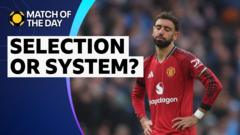Is Man Utd's Team Selection Hurting Their Performance?

Published: 2025-09-14 23:15:24 | Category: sport
In the recent Manchester derby, pundit Danny Murphy scrutinised Manchester United's tactical setup, arguing that the current squad lacks the necessary attributes to effectively implement Ruben Amorim's preferred 3-4-3 formation. This critique followed United's disappointing 3-0 defeat to Manchester City, where key players like Bruno Fernandes and Luke Shaw faced significant challenges.
Last updated: 04 October 2023 (BST)
Key Takeaways from the Manchester Derby
- Manchester United suffered a 3-0 defeat to Manchester City.
- Danny Murphy questioned the suitability of the squad for Amorim's 3-4-3 system.
- Bruno Fernandes and Luke Shaw's performances were particularly under scrutiny.
- The match highlighted tactical weaknesses within Manchester United.
- Amorim's system may not align with the current players' strengths.
Understanding the 3-4-3 System
The 3-4-3 formation is a tactical setup that places emphasis on attacking play while maintaining a solid defensive structure. It typically utilises three central defenders, four midfielders who can contribute both offensively and defensively, and three forwards to create scoring opportunities. This system requires players who are versatile, capable of transitioning quickly between defence and attack, and who possess stamina and tactical awareness.
Manchester United's Tactical Struggles
In the match against Manchester City, Manchester United's execution of the 3-4-3 was painfully evident. The players seemed unable to adapt to the demands of this formation, leading to gaps in both defence and midfield. Murphy pointed out that the lack of suitable personnel for this tactical approach was a significant factor in the defeat.
Bruno Fernandes: A Misfit in the System?
Bruno Fernandes, typically a creative force for Manchester United, struggled to find his rhythm against City. His inability to effectively link up with forwards or provide the necessary defensive cover was highlighted by Murphy. In a 3-4-3, a player like Fernandes needs to excel in both providing offensive creativity and performing defensive duties, a dual responsibility that seemed to overwhelm him during the match.
Luke Shaw's Defensive Challenges
Similarly, Luke Shaw, who has been a reliable presence for United, faced difficulties adapting to the demands of playing as a wing-back. This role requires not only a strong defensive capability but also the ability to push forward and support attacking plays. Shaw's performance was scrutinised, with many noting that he struggled to balance these responsibilities effectively, often leaving defensive gaps that City exploited.
What Does This Mean for Manchester United?
The implications of this tactical mismatch are significant for Manchester United. As they navigate a challenging Premier League season, the need for a clearer tactical identity is paramount. The criticism from Murphy highlights a broader concern: whether the current squad is capable of executing the strategies set out by the coaching staff.
Potential Solutions for United
To address these issues, Manchester United might consider several strategies:
- Player Recruitment: Bringing in players who are accustomed to the 3-4-3 system could improve adaptability and performance.
- Tactical Adjustments: The coaching staff may need to reassess their tactical approach, possibly reverting to a formation that better suits the current squad.
- Player Development: Investing in the development of existing players to enhance their versatility and tactical understanding could yield long-term benefits.
Looking Ahead: The Future for Ruben Amorim
Ruben Amorim's tenure as a tactical innovator is under scrutiny, especially after a high-profile defeat. As Manchester United continues to grapple with its identity, the effectiveness of Amorim's strategies will come under increasing pressure. The club must weigh the potential benefits of sticking with a transformative system against the immediate need for results.
Conclusion
As Manchester United faces an uphill battle to secure a consistent performance level, the insights from pundits like Danny Murphy serve as a wake-up call. The club must critically assess its personnel, tactics, and overall direction. A failure to adapt could see them continue to struggle against top-tier opponents like Manchester City. The question remains: can Manchester United find a tactical identity that plays to their strengths, or will they continue to face challenges as they navigate the complexities of modern football?
FAQs
What is the 3-4-3 formation?
The 3-4-3 formation is a tactical setup in football that consists of three defenders, four midfielders, and three forwards. It emphasises both attacking play and a solid defensive structure.
Why did Manchester United struggle against Manchester City?
Manchester United struggled due to a mismatch between their players' skills and the demands of the 3-4-3 system, leading to poor performances from key players like Bruno Fernandes and Luke Shaw.
What can Manchester United do to improve their performances?
Manchester United can consider recruiting players suited to the 3-4-3 system, adjusting their tactical approach, or focusing on player development to enhance versatility and tactical understanding.
Who is Ruben Amorim?
Ruben Amorim is a Portuguese football manager known for his tactical innovations. He currently manages Manchester United and is tasked with implementing effective strategies for the team.
What are the implications of tactical changes for a football club?
Tactical changes can significantly impact a football club's performance, affecting player morale, team cohesion, and match outcomes. It’s crucial that changes align with the squad's strengths.



